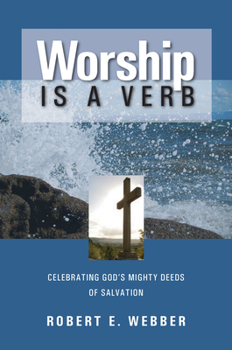Worship is a Verb: Eight Principles for Transforming Worship
Select Format
Select Condition 
Book Overview
Worship isn't a showcase for talented performers, a lecture on textual criticism, or a social occasion. It's the most intimate relationship you can have with your Savior. This modern classic shows you... This description may be from another edition of this product.
Format:Paperback
Language:English
ISBN:1565632427
ISBN13:9781565632424
Release Date:January 1996
Publisher:Hendrickson Publishers
Length:240 Pages
Weight:0.78 lbs.
Dimensions:0.7" x 5.9" x 8.9"
Age Range:18 years and up
Grade Range:Postsecondary and higher
Customer Reviews
1 rating
Worship Is a Verb
Published by Thriftbooks.com User , 16 years ago
Wheaton's Professor Robert E. Webber challengs us to rediscover and reemphasize worship, rooting it in the ancient liturgical wisdom of the Church. His presentation prompted me to re-read Webber's Worship Is a Verb (Waco: Word Books, c. 1985), a book designed "pri¬marily as a study guide and tool for the implemen¬tation of worship renewal" (p. 8). As the title suggests, Webber wants Christians to become participants in, not observers of, wor¬ship services. Too much of our public wor¬ship, he thinks, focuses on the pastor and his sermon. When pastors do everything--making an¬nouncements, reading Scripture, praying the pas¬toral prayer, preaching the sermon--the people become spectators. (Or, worse yet: fans!) One of my students, who plans to enter the ministry, recently wrote a thoughtful essay, reflecting on his position paper on ministerial ethics. He asked how pastors avoid becoming "idols" in the minds of their people. (For many of us, I responded, there's no problem: we fail so regularly in the pulpit that no one's tempted to idolize us!) Yet, as I thought about it, there is a certain irony to the Protestant pulpit: having banished the crucifix and images from church, we often seek to install a "star" behind the pulpit! Everything in the Sunday services, as well as the weekly business routines of the institution, must focus on and revolve around the "senior pastor." So I think Webber's rightfully concerned. To really worship God in His holiness, entering into the mystery of His pre¬sence, involves us in the "liturgy" (i.e. the "work") of confession, prayer, praise, communion. And above all it celebrates Jesus Christ. Given the principle that "worship cele¬brates Christ," Webber sets forth "this rule of thumb for worship: Worship tells and acts out the Christ-event. In this sense, the order of worship comes from above, not below." Worship should reflect the God who has spoken and incarnated himself. "Therefore, the twofold focus of worship is the Word (the Bible as the symbol of God speaking) and the Table (bread and wine as the symbol of God acting to save us)" (p. 49). This pattern, amply documented, comes from the earliest practices of the Christian Church. As ancient believers assembled together, they first prepared themselves for worship through hymns, invocations, confessions. Then they listened to the Word of God as biblical passages were read and expounded. (Webber rebukes evangelicals for read¬ing so little Scripture and preaching so topi¬cally! Such allows too many pastors to regularly ride favorite hobby-horses to death!) After the Word came the Table. Wherever be¬lievers worshipped they came to the Table and con¬sumed its bread and wine. Webber has "found the Table, like the Word, to be a satisfying means of nourishment and spiritual growth. Far from becom¬ing routine, it has become like an intimate rela¬tionship. For me, Communion is a personal ex¬perience of Jesus Christ" (58).






